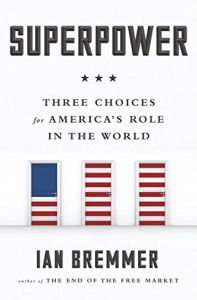Join getAbstract to access the summary!

Join getAbstract to access the summary!
Ian Bremmer
Superpower
Three Choices for America’s Role in the World
Portfolio, 2015
What's inside?
In foreign affairs, America must choose a new way forward.
Recommendation
US taxpayers have grown weary of messy, expensive wars, so which foreign policy course should the world’s one superpower take? Political consultant, author and lecturer Ian Bremmer offers a thoughtful look at the possibilities. After laying out his view of the new geopolitical landscape, he proposes three scenarios. The first is for the United States to pull back from foreign entanglements and refocus on domestic issues. The second, “Moneyball America,” calls for a practical, flexible approach to foreign policy. The third positions the US as global policeman. getAbstract – while always politically neutral – recommends Bremmer’s analysis to international businesspeople, NGOs, political scientists, investors, and readers seeking a cogent description of US international relations and their implications.
Summary
About the Author
Ian Bremmer is president and founder of Eurasia Group, a consulting firm. The author of nine books, including The End of the Free Market, he’s a columnist for Time magazine.























Comment on this summary